|
Books Should Be Free Loyal Books Free Public Domain Audiobooks & eBook Downloads |
|
|
Books Should Be Free Loyal Books Free Public Domain Audiobooks & eBook Downloads |
|
Poetry |
|---|
|
Book type:
Sort by:
View by:
|
By: Fujiwara no Teika (ed.) | |
|---|---|
 One Hundred Verses from Old Japan
One Hundred Verses from Old Japan
In 12th-13th century Japan there lived a man named Fujiwara no Teika (sometimes called Sadaie), a well-regarded poet in a society that prized poetry. At one point in his life he compiled the Ogura Hyakunin Isshu (often known simply as the Hyakunin Isshu), which means “A Hundred Poems by A Hundred Poets” (literally “A hundred people, one poem [each]“). This collection of a hundred poems is known to almost all Japanese, and over the years it has been translated by many different people. One of the early translators of the collection was William Porter. His translation, first published in 1909, was titled “A Hundred Verses from Old Japan”. | |
By: Fulke Greville (1554-1628) | |
|---|---|
 A Treatise of Religion
A Treatise of Religion
Part diatribe, part discourse, part sermon and part stand-up comedy, this is Fulke Greville's 114 stanza, verse-poem about religious hypocrisy. | |
By: G. Boare | |
|---|---|
 What became of Them? and, The Conceited Little Pig
What became of Them? and, The Conceited Little Pig
| |
By: G. K. Chesterton (1874-1936) | |
|---|---|
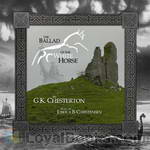 The Ballad of the White Horse
The Ballad of the White Horse
An English epic poem that follows the exploits of Alfred the Great in his defense of Christian civilization in England from the heathen nihilism of the North. Following a string of defeats at the hands of the invading Danes, a vision from heaven in the river island of Athelney fills Alfred with joy and hope. Though it gives no promise of victory in the coming struggle, it inspires him to rally his chieftains for a last stand against the invading hordes. His adventures lead throughout the country... | |
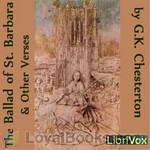 The Ballad of St. Barbara and Other Verses
The Ballad of St. Barbara and Other Verses
This book of poetry by G.K. Chesterton, originally published in 1922, contain 35 poems on a variety of subjects. | |
 Poems
Poems
Originally published in 1916, this book of poetry by G.K. Chesterton includes 59 poems on a variety of subjects. Included in this are war poems, love poems, religious poems, ballades and more. | |
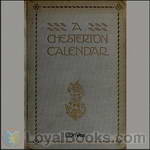 A Chesterton Calendar
A Chesterton Calendar
Go through the year, day by day, with the wit and wisdom of G.K. Chesterton! Compiled from the writings of 'G.K.C', both in verse and in prose, each day of the year is provided with a generally short quotation from one of his many works. Also includes a section apart for the moveable feasts. | |
 Wine, Water and Song
Wine, Water and Song
A collection of 16 poems by G.K. Chesterton. All of the poems in this book, except for "The Strange Ascetic" are taken from "The Flying Inn", a book by the same author. | |
 Wild Knight and Other Poems
Wild Knight and Other Poems
A collection of poems that tend to revolve around the theme of the wonder of the world. It includes the short, poetic play, "The Wild Knight". | |
 Greybeards at Play
Greybeards at Play
G.K. Chesterton's first publication, "Greybeards at Play" is a collection of poetry and accompanying illustrations. The work is marked by the irreverent whimsy and ancient delight that would eventually be recognized as Chesterton's signature style. Short (only four poems long and a dedication), playful, and with a touch of awe, Chesterton's first piece (written at 26) is appropriately titled: it is the work of an amateur, mature in his spirit, young in his play. - | |
By: G. M. George | |
|---|---|
 Plain Jane
Plain Jane
| |
By: Gaius Valerius Catullus (84 BC - 54 BC) | |
|---|---|
 The Poems and Fragments of Catullus Translated in the Metres of the Original
The Poems and Fragments of Catullus Translated in the Metres of the Original
| |
By: Galloway Kyle (1871-) | |
|---|---|
 A Cluster of Grapes A Book of Twentieth Century Poetry
A Cluster of Grapes A Book of Twentieth Century Poetry
| |
By: Gelett Burgess (1866-1951) | |
|---|---|
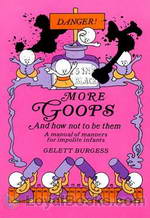 More Goops and How Not to Be Them
More Goops and How Not to Be Them
Deep in the heart of every parent is the wish, the desire, to have other adults tell us, in an unsolicited way, just how very polite one’s child is! This perhaps was even more the case in 1903, when Gelett Burgess produced his second book on the Goops. With entertaining cartoons – cariacatures of misbehaving children – he described many different breaches of tact and good manners. Burgess wrote several books of poetry on the Goops, each poem describing some significant way in which an unthoughtful or unkind child could offend polite society and often offering the hope that the listener would never behave that way... | |
By: Geoffrey Chaucer (c. 1343-1400) | |
|---|---|
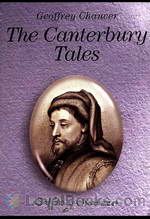 The Canterbury Tales
The Canterbury Tales
Anyone who has ever been on a package tour with a group of strangers who soon become friends, and passed time swapping stories with them, would instantly identify with this timeless classic of English literature. The Canterbury Tales by Geoffrey Chaucer recounts twenty different stories recounted by a diverse group of pilgrims who gather at The Tabard Inn in Southwark, near London, before setting out for the shrine of Thomas Becket in Canterbury. The Host of the inn proposes that they entertain themselves by telling stories along the route and the one who tells the best tale would win a prize – a meal at Bailey's tavern, sponsored by the losers... | |
By: George Alfred Townsend (1841-1914) | |
|---|---|
 Bohemian Days Three American Tales
Bohemian Days Three American Tales
| |
By: George Augustus Baker (1849-1906) | |
|---|---|
 Point Lace and Diamonds
Point Lace and Diamonds
| |
By: George Cabot Lodge (1873-1909) | |
|---|---|
 Song of the Wave, and Other Poems
Song of the Wave, and Other Poems
This is an 1898 volume of poetry by American poet George Cabot Lodge. Its title-poem refers to the Sea, and the Sea does seem to be the main character of this book, making its appearance in many of the poems throughout the first part of the volume. The second part of the book is a collection of 40 sonnets on more varied topics. - Summary by Carolin | |
By: George Colman (1762-1836) | |
|---|---|
 Broad Grins Comprising, With New Additional Tales in Verse, Those Formerly Publish'd Under the Title "My Night-Gown and Slippers."
Broad Grins Comprising, With New Additional Tales in Verse, Those Formerly Publish'd Under the Title "My Night-Gown and Slippers."
| |
By: George Crabbe (1754-1832) | |
|---|---|
 The Library
The Library
| |
 Village and The Library
Village and The Library
The Village is Crabbe’s corrective to the rosy-tinted view of English village and rural working class life. He was a stark realist, as a priest and surgeon having been privy to so much of actual, rather than ideal, life. The Library is his appreciation of the value of books and literature. George Crabbe was an English poet, surgeon, and clergyman. He is best known for his early use of the realistic narrative form and his descriptions of middle and working-class life and people. Lord Byron described him as "nature's sternest painter, yet the best... | |
 Momentary Grief
Momentary Grief
volunteers bring you 18 recordings of Momentary Grief by George Crabbe. This was the Weekly Poetry project for January 30, 2022, in honour of Crabbe's 190th birthday on February 3. ----- George Crabbe was an English poet, surgeon and clergyman. He is best known for his narrative poetry. This piece reflects the religious facet of his life. - Summary by TriciaG and Wikipedia | |
By: George Eliot (1819-1880) | |
|---|---|
 How Lisa Loved the King
How Lisa Loved the King
| |
By: George Essex Evans (1863-1909) | |
|---|---|
 The Secret Key, And Other Verses
The Secret Key, And Other Verses
Born in London of Welsh parents, George Essex Evans was raised and educated by his mother Mary Ann in Pembrokeshire after she was widowed when George was only a few months old. Emigrating to Queensland with his siblings to Australia at age 17 with the intention of farming, Evans was badly injured in a horse-riding accident, when he was thrown against a tree and was unable to do any physical work. Evans was described as a reserved man, and at times rather moody and impulsive. However, he was also described as a kind person and a loyal friend... | |
By: George F. Dillon (1836-1893) | |
|---|---|
 Song Celestial; Or, Bhagavad-Gîtâ
Song Celestial; Or, Bhagavad-Gîtâ
| |
By: George Gascoigne (1535-1577) | |
|---|---|
 Adventures of Master F.J.
Adventures of Master F.J.
This story presents through letters, poems and third-person commentary the love affair between a young man named Freeman Jones and a married woman named Elinor, lady of the castle he is visiting in Scotland. Events in the affair are traced from initial attraction through seduction to (somewhat) graphic sexual encounters and their aftermath. (Allegedly based on a real-life scandal, the author, in re-issuing his story two years later, transplanted the action to Italy, renaming the principals Fernando Jeronimi and Leonora.) | |
By: George Gordon Byron, Lord (1788-1824) | |
|---|---|
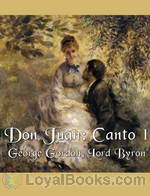 Don Juan: Canto I
Don Juan: Canto I
The legend of Don Juan is one that's been told and retold over the centuries by poets and novelists. His life has been the subject of operas, musicals and film. The earliest reference was in a fourteenth century Spanish play and compiled in book form in the seventeenth century. His life continued to fascinate writers like Moliere, Byron, Bernard Shaw, Pushkin, Shakespeare, Jose Saramago and musicians like Mozart, whose Don Giovanni is a brilliant work that still charms audiences and music lovers all over the world... | |
By: George Graham Currie (1867-1926) | |
|---|---|
 Love Songs
Love Songs
This is a collection of love songs by Canadian-born Floridian Poet Laureate George Graham Currie. As poetry is the key to the hearts of many people, all listeners are well-advised to pay special attention to these collected poems. - Summary by Carolin | |
 Sonnets
Sonnets
This is a book of sonnets by George G. Currie. Currie was a Canadian-born lawyer and business man, but also an accomplished author and poet. While he traveled the United States and Europe extensively throughout his life, he settled in Florida. Both the theme of traveling as well as Florida occur frequently in his poetry. - Summary by Carolin | |
By: George Henry Borrow (1803-1881) | |
|---|---|
 The Mermaid's Prophecy and Other Songs Relating to Queen Dagmar
The Mermaid's Prophecy and Other Songs Relating to Queen Dagmar
| |
 Signelil a Tale from the Cornish, and Other Ballads
Signelil a Tale from the Cornish, and Other Ballads
| |
 The King's Wake and Other Ballads
The King's Wake and Other Ballads
| |